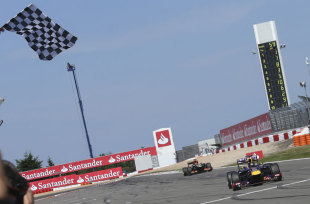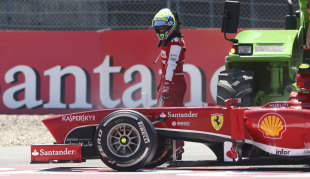- German Grand Prix - The Final Stint
Wunderbar Vettel
A round-up of the good, the bad and the downright ugly from the 2013 German Grand Prix

- Race:
- German Grand Prix
Seb breaks his duck
Sebastian Vettel's victory on Sunday put an end to one of the media's favourite stats. Over the last two summers journalists have taken a certain amount of joy in pointing out to the three-time world champion that he has never won in July or at his home race. Now they will have to go through his career statistics to find another weak point to bother him with, but they are quickly running out of material. The victory clearly meant a lot to Vettel and the fact he was made to work for it only heightened the excitement in his voice on the team radio after the race. At 26 years of age (he celebrated his birthday on Wednesday) he has won 30 races and three world championships. To put that in perspective, Michael Schumacher, who won 91 races during his career, had won just 10 races at the same age. By the end of his career it may be easier to list the records Vettel doesn't hold rather than the ones he does, but failing to win in July or on home soil won't be among them.
The perfect weekend for Pirelli
While the British Grand Prix was a disaster from Pirelli's point of view, the German Grand Prix was quite the opposite. The tyre company pulled off an impressive recovery by delivering a complete race allocation of revised tyres to the Nurburgring within two days, and, while it had to be very careful with how it advised the team to run the tyres this weekend, Pirelli delivered an exciting grand prix. Strategies were mixed throughout the field, with different teams opting to start on different compounds and it was only in the final 10 laps of the race that a four-way fight for victory emerged. Ultimately Vettel held on to the lead to take victory, but even the soft tyres held up better than expected and allowed some very aggressive final stints. Paul Hembery admitted he was relieved that the tyres were being talked about for the right reasons, and Pirelli deserves credit for helping facilitate an exciting, close race.
The Story of the Weekend

- Shock: Romain Grosjean - Consistently quick, before the safety car he was emerging as favourite for victory
- Shocker: Felipe Massa - Running sixth an early spin put him out of the race and cost Ferrari vital points
- Best overtake: Sergio Perez - Pulled a strong move around the outside of Pastor Maldonado at Turns 1 and 2, firm but fair between both
- Best lap: Romain Grosjean - Once he was given clear air at the end of his first stint he absolutely flew and over laps 10, 11, 12 and 13 he managed to leap frog his team-mate and Hamilton using some rather second-hand softs Fernando Alonso - At the end of lap 48 he passed Ricciardo and then Sutil within a lap
- Worst lap: Jules Bianchi - His engine blew on lap 24, but he jumped out so quickly the car rolled downhill across the track to bring out the safety car
- Drive of the day: Sebastian Vettel - On a day when the Lotuses were quicker he still got the job done thanks to a great start, quick laps when it mattered and an impressive ability to soak up pressure
Mercedes' struggles return
Heading to Germany, Mercedes had won two of the last three races and there was genuine optimism the tyre degradation issues of the early season were gone. But on a track where there are several big traction events and long-radius, slow corners the same issues emerged. The new rear tyres brought to the Nurburgring could have something to do with it (that's what Lewis Hamilton blamed after the race), but it may be that they were never solved. Thermal degradation was more of an issue this weekend than at any of the last three races, where the track layouts flattered the Mercedes. In Monaco and Canada the track surface meant there were lower levels of degradation and in Silverstone it tended to be the front tyres that gave up first. On a more normal circuit like the Nurburgring the problems returned. A hot Hungaroring is likely to be even worse and, without a test at Silverstone to understand the new tyres, Mercedes could be facing one of its worst rounds of the season. There is still a lot of work to do in Brackley.
Drivers unite
On Thursday evening, a Grand Prix Drivers' Association meeting ended with a statement that warned the drivers were willing to boycott the German Grand Prix should there be any safety issues with the Pirelli tyres. Ultimately - as the GPDA admitted in its statement - it was unlikely that any such situation should arise, but this was a timely message. Pirelli had already announced which changes it was making to the tyres in order to enhance safety, while a few days had passed since the worrying scenes at Silverstone, which meant emotions were no longer running so high. The GPDA was not eager to boycott, nor was it likely to, but the drivers were drawing the line and firmly stating that solutions have to be found; essentially challenging their employers - the teams - and the FIA to agree on a way forward.
Pit lane dangers
Pit lanes are inherently dangerous places to work. Cars driving above the national speed limit of some countries and people trying to work on very specific jobs do not mix. Sunday's accident was proof of that, as one of Webber's wheels turned into a potentially lethal and uncontrollable wrecking ball. The camera man involved suffered a broken collar bone and cracked ribs but it could have been much worse. Red Bull were fined €30,000 but it will likely result in tighter restrictions on who is allowed in the pit lane and also dictate what they should wear. At the 24 Hours of Le Mans any person in the pit lane during the race has to wear a helmet and race suit and a similar rule may be introduced in F1.
An atmospheric weekend
You can't help but be enchanted by the Nurburgring, driving alongside parts of the undulating Nordschleife on the way in and out of the circuit. However, the atmosphere inside the paddock was electric on more than one occasion for reasons other than motor sport. On Friday night it was Force India which was the location for a bunch of the British press to watch Andy Murray's Wimbledon semi-final, but the first real event was on Saturday morning. Many Formula One journalists have big interests in other sports and it was a packed McLaren motorhome which had the British and Irish Lions' deciding test against Australia on wall-to-wall screens. The noise made for each try was enough to wake Jenson Button from his pre-qualifying nap, but he too showed his interest when the McLaren evening press call was delayed so he (and many others) could watch Chris Froome win a stage on the Tour de France. On Sunday, the Wimbledon final was shown in many motorhomes and the screams of delight from McLaren for Andy Murray's victory could be heard in up and down the paddock.

